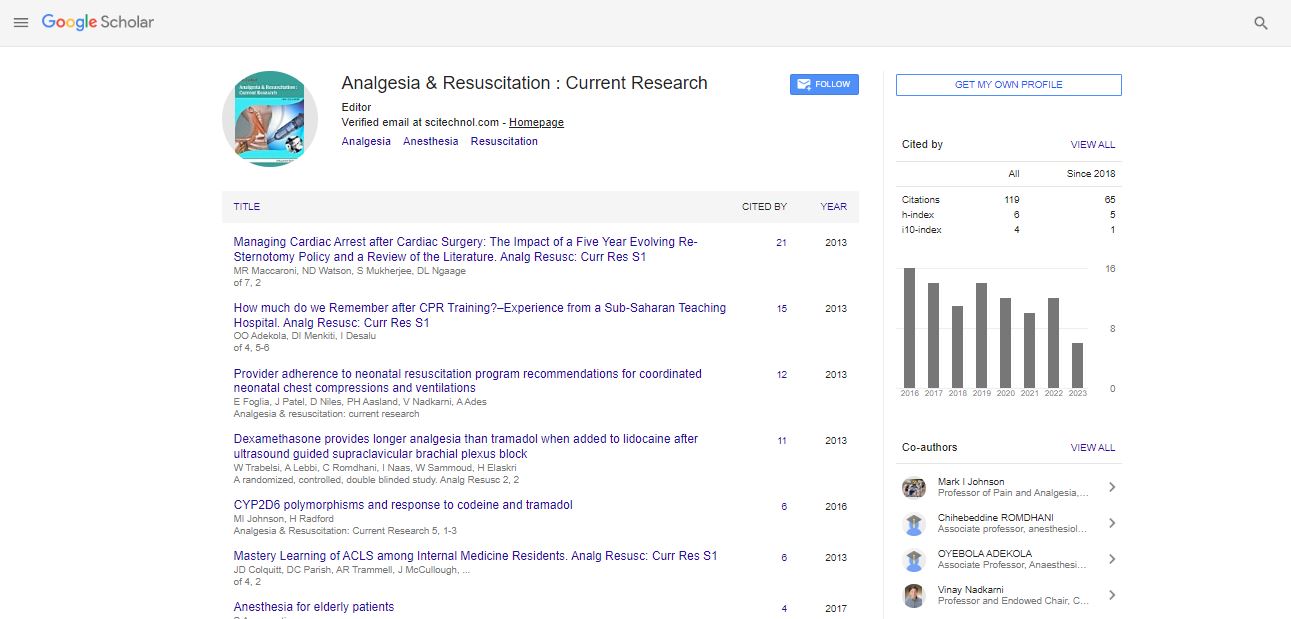Editorial, Analg Resusc Curr Res Vol: 10 Issue: 2
Sedation: Makes sleep off
Manuel Ignacio Monge Garcia*
Medical University of Cádiz, Spain
*Corresponding Author:
Manuel Ignacio Monge Garcia
Medical University of Cádiz, Spain
E-mail: ignaciomonge@gmail.com
Received Date: March 22, 2021; Accepted Date: March 24, 2021; Published Date: March 31, 2021
Citation: Garcia MIM (2021) Sedation: Makes Sleep off. Analg Resusc: Curr Res 10:2.
Copyright: © All articles published in Dental Health: Current Research are the property of SciTechnol, and is protected by copyright laws. â??Copyright © 2021, SciTechnol, All Rights Reserved.
Keywords: sedation, Analgesia
Sedation is used to extend patient cooperation throughout the examination and for reducing pain and discomfort .It is outlined as a drug-induced depression. Sedation is typically given into your vein (IV or intravenous), however will generally be orally (mouth) or through a face mask. There are four levels of sedation, starting from minimal sedation to general anesthesia.Heavy sedation in vital care to facilitate endotracheal tube tolerance and ventilator synchronization, often with neuromuscular blocking agents, was routine until relatively recently .
What are the variations between sedation and general anaesthesia?
The main differences between sedation and general anaesthesia are:
1. Your level of consciousness
2. The requirement for equipment to assist support your respiratory
3. Possible side effects.
With minimal and moderate sedation you feel drowsy, comfortable, sleepy headed or relaxed, but you stay aware throughout the procedure. With general anaesthesia you are completely unresponsive and unconscious during the procedure. Deep sedation is between the two.
What are the alternatives to sedation?
1. a general anaesthetic: you will be totally unconscious throughout and have no memory of the procedure.
2. Local anaesthetic without any sedation: you will be fully awake during your treatment, but will be comfortable. A screen can be placed to stop you seeing the procedure.
Why is it important?
How much sedation is given, and for the means long, is very important in crucial patient outcome as each over and undersedation will have doubtless harmful consequences. Over-sedation will increase time on improvement support and prolong intensive care unit period of keep. Under-sedation will cause hyper-catabolism, immunosupression, hypercoagulability, and exaggerated sympathetic activity. Haemodynamic responses as a live of sedation are unreliable within the critically sick patient, thus the requirement for formal sedation analysis.
Sleep on the ICU
Sleep is outlined as a natural periodic state of rest for the mind and body, within which the eyes sometimes shut and consciousness is totally or part lost, in order that there’s a decrease in bodily movement and responsiveness to external stimuli. It’s a vital element within the recovery from important unwellness and deprivation could impair tissue repair and overall cellular immune operate. However, sleep (quantity and quality) will be troublesome to realize in an intensive care unit surroundings. Sedation within the intensive care unit is, paradoxically, each a cause and a possible treatment for the sleep disruption virtually universally determined within the critically sick .
Levels of sedation
1. Minimal sedation – normal response to verbal stimuli.
2. Moderate sedation – purposeful response to verbal/tactile stimulation. (This is usually referred to as “conscious sedation”)
3. Deep sedation – purposeful response to repeated or painful stimulation.
4. General anesthesia – unarousable even with painful stimulus.
 Spanish
Spanish  Chinese
Chinese  Russian
Russian  German
German  French
French  Japanese
Japanese  Portuguese
Portuguese  Hindi
Hindi 
